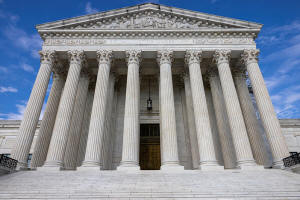ESG investing rule presents early test on limits of US agency powers
 Send a link to a friend
Send a link to a friend
 [July 08, 2024]
By Daniel Wiessner [July 08, 2024]
By Daniel Wiessner
(Reuters) - A challenge to a Biden administration rule allowing socially
conscious investing by employee retirement plans will present an early
test of how courts will scrutinize federal regulations after the U.S.
Supreme Court said they no longer have to defer to the expertise of the
agencies that issued them.
The New Orleans-based 5th U.S. Circuit Court of Appeals will hear
arguments on Tuesday in a lawsuit by 25 Republican-led states
challenging the U.S. Department of Labor rule, which says 401(k) and
other plans can consider environmental, social and corporate governance
(ESG) factors as a "tiebreaker" in making investment decisions.
U.S. District Judge Matthew Kacsmaryk in Amarillo, Texas, refused to
block the 2022 rule last year, citing a 40-year-old doctrine known as
Chevron deference, named for a 1984 Supreme Court case, which had
directed courts to uphold agencies' reasonable interpretations of the
laws they enforce.
Kacsmaryk, an appointee of Republican former President Donald Trump, is
the lone active judge in Amarillo and his courthouse has become a
favored venue for conservative litigants suing to block Biden
administration policies. But in the challenge to the ESG rule, the judge
said he was bound to apply Chevron until the Supreme Court overturns it.
The high court did just that in a June ruling in Loper Bright
Enterprises v. Raimondo, saying judges instead should exercise their
independent judgment in evaluating agency rules.

That decision is expected to have a widespread impact on the
government's ability to adopt new rules such as environmental,
securities and labor regulations, and is part of a broader effort by
conservative groups to rein in the powers of what they call "the
administrative state."
And the case over the ESG rule will give the 5th Circuit a chance to
unpack the Supreme Court's directive that courts should exercise their
independent judgment and consider what framework the appeals court will
apply to cases challenging agency rules moving forward.
"The trial court expressly relying on Chevron in upholding the ESG
regulation ... puts this case on track to be an early harbinger of how
courts will address pending cases," said Julie Stapel, a Chicago-based
lawyer with the firm Morgan Lewis & Bockius who represents employers.
Lawyers for the states that sued over the ESG rule and the U.S.
Department of Justice, which is defending it, did not respond to
requests for comment.
[to top of second column]
|

A view of the U.S. Supreme Court in Washington, U.S. June 29, 2024.
REUTERS/Kevin Mohatt/File Photo

In a June 28 letter to the 5th Circuit, the states said the Supreme
Court decision released earlier that day bolstered their lawsuit.
Citing the ruling, they said courts should consider deferring to
agencies only when regulations are adopted shortly after the laws
they interpret and remain consistent over time.
Under that standard, the Labor Department is not owed deference
because its position on whether a 1974 law regulating employee
benefit plans permits ESG investing has shifted multiple times, the
lawyers wrote.
The Justice Department in a filing responding to the states said it
had not cited Chevron in its court briefs and that the 5th Circuit
panel should use its independent judgment in determining whether the
rule is valid.
$12 TRILLION
The key issue in the case is whether the 1974 law, the Employee
Retirement Income Security Act, allows retirement plans to consider
nonpecuniary factors in making investment decisions. The Labor
Department in adopting the rule said the law is silent on the issue
and that considering ESG topics is allowed as long as financial
factors come first.
The rule has been sharply criticized by conservatives who say that
infusing a political agenda into investment decisions endangers
workers' retirement savings. The rule covers plans that collectively
invest $12 trillion on behalf of more than 150 million workers and
retirees.
The 5th Circuit is widely regarded as the most conservative U.S.
appeals court and in recent years had largely abandoned the Chevron
doctrine while blocking a number of Biden administration
regulations. All three judges on Tuesday's panel were appointed by
Republican presidents.
The fact that the ESG rule is coming before the 5th Circuit may
blunt the impact of the Supreme Court ruling on the case, said
Katherine Kohn, a Washington, D.C.-based lawyer at the firm Thompson
Hine who counsels companies on employee benefits issues.
"If the 5th Circuit is inclined to vacate the rule, there is
probably a path for that even if we were still living under
Chevron," she said, "although the Loper Bright decision certainly
makes it simpler for the 5th Circuit to side with the (states)."
(Reporting by Daniel Wiessner in Albany, New York, Editing by Alexia
Garamfalvi and Matthew Lewis)
[© 2024 Thomson Reuters. All rights reserved.]This material
may not be published, broadcast, rewritten or redistributed.
Thompson Reuters is solely responsible for this content. |